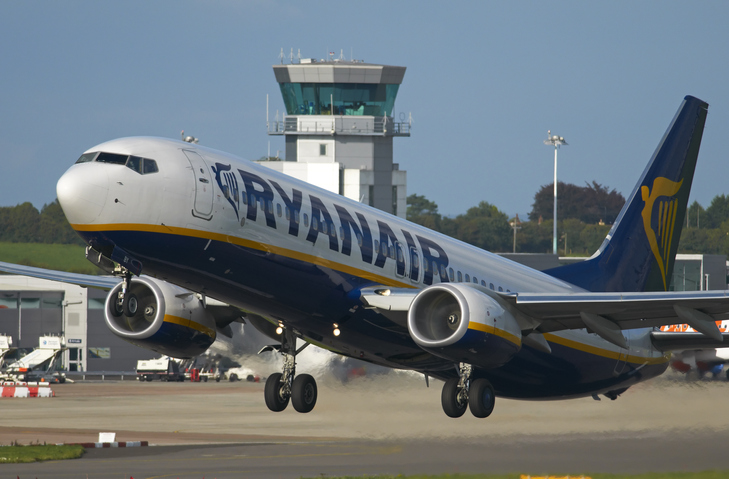ii view: Spanish travel changes overshadow at Ryanair
Will a 15% plus gain in the share price since late March now stall given UK travel changes from Spain?
27th July 2020 11:30
by Keith Bowman from interactive investor
Will a 15% plus gain in the share price since late March now stall given UK travel changes from Spain?

First-quarter results to 30 June 2020
- Revenue down 95% to €125 million
- Loss of €185 million, down from a profit of €243 million Q1 last year
- Over €3.9 billion of cash held
- Net debt up 116% to €872.2 million from March
Guidance:
- Expects to carry around 60 million passengers this financial year
- Expects to make a smaller loss in the current second quarter than in the first
ii round-up:
Low-cost airline Ryanair (LSE:RYA) today reported a better than expected first-quarter loss as its fleet of aircraft was all but grounded under the Covid-19 pandemic.
But cautious outlook comments regarding fears of a second virus spike, a cut in expected passenger numbers over the full-year from 80 million to 60 million and new quarantine rules announced by the UK government regarding Spain all overshadowed.
Ryanair shares fell by more than 7% in early trade, with shares for rival airlines such as easyJet (LSE:EZJ) and British Airways owner IAG (LSE:IAG) also down by 11% and 9% respectively. Ryanair shares since the UK’s lockdown in late March are up by more than 15% compared to fall of 11% for IAG.
Broker Morgan Stanley estimates that Spain-UK routes account for around 17% of Ryanair’s business. A UK government decision over the weekend to force returning passengers to self-isolate for 14 days will hit demand and may impact other routes as consumers consider other possible sudden changes going forward.
Ryanair is for now forecasting a reduced second-quarter loss based on a limited return of flights over the summer as coronavirus restrictions are eased. It expects to operate approximately 40% of its normal July flights, rising to around 60% in August.
The reported first quarter loss of €185 million was better than the €200 million plus loss it forecast back in May. Over 99% of its fleet was grounded from March to June.
Given fears for a second virus spike and the degree of outlook uncertainty, it continues to provide no full-year financial estimates.
Group cash stood at over €3.9 billion at the end of June, enough Morgan Stanley estimates for Ryanair to continue in business for over 16 months, even if its planes were completely grounded.
Management remains hopeful regarding the delivery of its first Boeing (NYSE:BA) MAX-200 aircraft before the end of 2020. The airplane was grounded by US authorities following two accidents. It has 4% more seats, 16% lower fuel burn and 40% lower noise emissions compared to its current alternative.
ii view:
Ryanair Holdings is the parent company of Buzz, Lauda, Malta Air & Ryanair itself. It normally carries over 150 million passengers annually on more than 2,400 daily flights from 82 bases. It connects over 200 destinations in 40 countries on a fleet of over 470 aircraft, with further Boeing 737s currently on order.
Many factors outside of management’s control, such as the weather, fuel costs and strikes can hinder financial performance. Company action to try and mitigate such factors is a feature across the industry. Now, the coronavirus has given the airline industry its biggest crisis yet.
For investors, swift action to conserve cash and its application to raise £600 million under the Bank of England’s Covid financing scheme have both helped to bolster its balance sheet. The group’s low-cost ticket and business model has proved highly popular with customers over recent years, placing significant competitive pressure on the former flag carrying airlines. But despite a 31% drop in the share price year-to-date, the degree of uncertainty regarding the outlook is still sizeable, with Ryanair shares for now, only for higher risk investors.
Positives:
- Cash liquidity of over €3.9 billion
- A leading low-cost business model
Negatives:
- Estimate of passenger numbers this year reduced
- Considers EU assistance to some rivals unfair
The average rating of stock market analysts:
Strong buy
These articles are provided for information purposes only. Occasionally, an opinion about whether to buy or sell a specific investment may be provided by third parties. The content is not intended to be a personal recommendation to buy or sell any financial instrument or product, or to adopt any investment strategy as it is not provided based on an assessment of your investing knowledge and experience, your financial situation or your investment objectives. The value of your investments, and the income derived from them, may go down as well as up. You may not get back all the money that you invest. The investments referred to in this article may not be suitable for all investors, and if in doubt, an investor should seek advice from a qualified investment adviser.
Full performance can be found on the company or index summary page on the interactive investor website. Simply click on the company's or index name highlighted in the article.